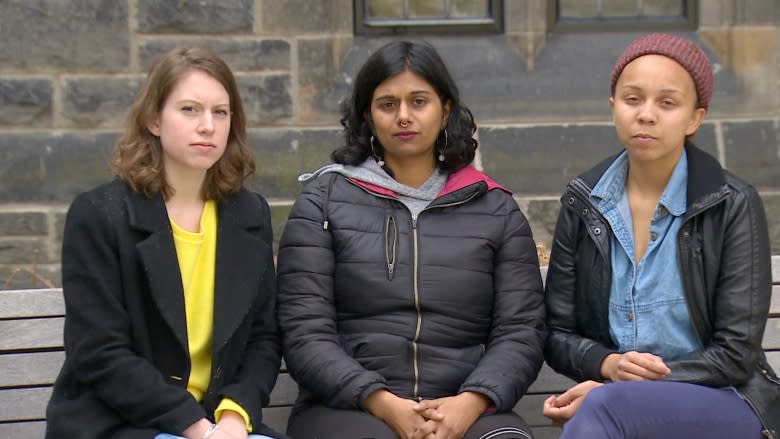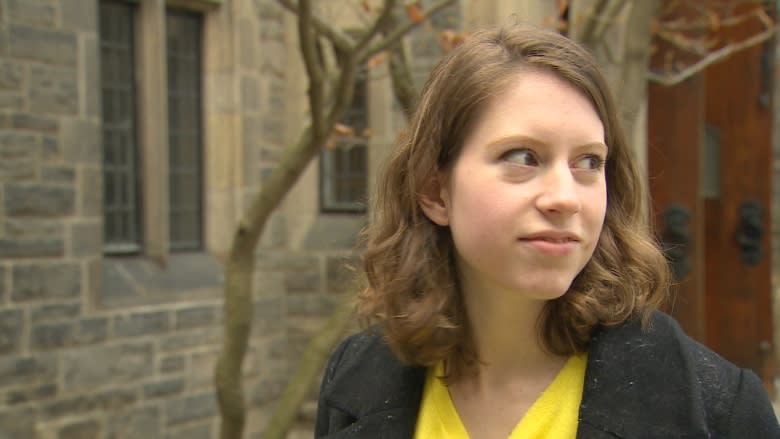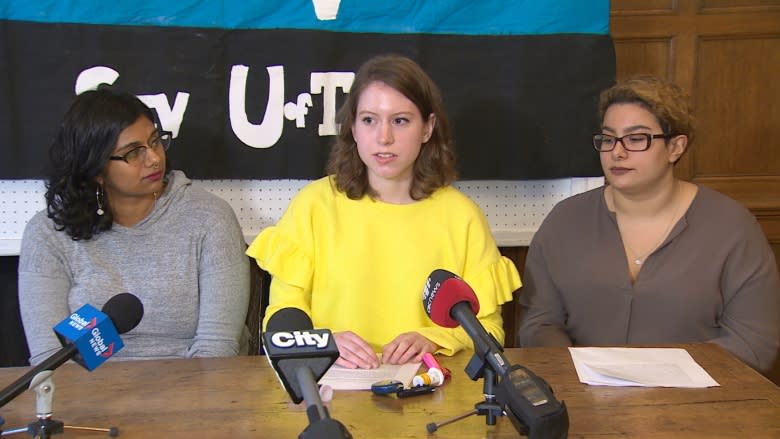U of T bungled 17-month sexual assault investigation, student alleges
Standing in the quad at Trinity College, undergraduate student Tamsyn Riddle has mixed emotions.
Calm and serene some days, and the site of campus parties on others, the tree-lined square at the University of Toronto's St. George campus is a place that calls to mind some fond memories for the 20-year-old from Peterborough.
"But at the same time, I think that when I leave, I'll always remember the feeling of walking through here and hoping that I wouldn't see my rapist," she said.
Riddle said she was sexually assaulted by a fellow first-year student in his dorm room on the night of Apr. 2, 2015 after a party in the quad.
On Tuesday, she filed a human rights application against both Trinity College and U of T, alleging the institutions failed to properly investigate her complaint or adequately sanction her fellow student, leaving Riddle to keep seeing him around campus — and feeling like she was lied to by the place meant to keep her safe.
Investigation took 17 months, application alleges
Riddle said she reported the incident to campus staff — and did not to go to police at their request. What followed was a "disorganized and delayed" investigation by the university, according to her human rights application.
The entire investigation took around 17 months to conclude, and the school provided "no clear procedure or point-person" throughout the process, the filing alleges.
Both college and university staff were dismissive of Riddle's concerns, the filing continues. The application cites a staff member telling Riddle not to go to the media because he didn't want her to be exposed to death threats as a "feminist."
It also states that at the start of the next school year, Riddle was informed that interim measures were being taken against the accused student, including banning him from being a frosh leader and attending frosh events.
He remains a student at the school to this day, Riddle said.
That was on Sept. 4, 2015. A day later, the application states, the student moved into his residence as a frosh leader and played in a frosh soccer game shortly after — right near Riddle's residence.
In a Wednesday news conference with Silence is Violence, a campus sexual assault survivor advocacy group, Riddle spoke of seeing the student she accuses of sexually assaulting her "two tables over in the dining hall," around the campus, and in promotional videos in the months that followed.
"All throughout this, I was scrambling to get academic accommodations," she said, while flanked by fellow students and survivor advocates Ellie Ade Kaur, Jassie Justice, and Mira El Hussein.
Riddle's application documents the emotional toll — including panic attacks and nightmares — and seeks general damages in the amount of $40,000 for the "stress, anxiety and academic setbacks" she says she faced thanks to the university's investigation process.
The filing also states the sudden conclusion of the investigation in August 2016 involved "no input or consultation" with Riddle.
None of the allegations have been proven at the tribunal.
U of T put new sexual violence policy in place in January
According to Riddle's lawyer, Emily Shepard, a main goal of the application is to try to get "some form of policy and procedure in place that would protect other students from the kind of experience that [Riddle] had."
But according to a U of T administrator, the school has already been working to do just that.
Terry McQuaid is the school's executive director of personal safety, high risk and sexual violence prevention and support — a newly-created role she's held since October last year.
That role was developed in response to advice from an expert committee, and was one of a series of actions taken by the school to address sexual violence. It's a discussion that's been happening at schools across the province — in part thanks to student concerns, and legislation requiring all post-secondary campuses to have a sexual violence policy in place by January 2017.
McQuaid said the school has indeed developed a policy, and within weeks of it becoming effective in January, centres to handle sexual assault and violence were opened at each of U of T's three campuses. The university also created a centralized, coordinated system for reporting sexual violence, she said.
"While we can't talk about specific cases, we've been working closely with our community to get to where we are today with the new streamlined policy and process," echoed university spokesperson Althea Blackburn-Evans in a statement.
"We spent two years consulting to ensure we get this right, and we're open to more feedback on how we support people who've experienced sexual violence."
Still, Riddle believes the university has a long way to go, and said sex assault only becomes a concern "when it's a PR issue."
Universities have a vested interest in hiding sexual violence that happens on campus, she added, so her hope is that they outsource investigations and counseling to external organizations, rather than use internal staff.
But whatever changes come won't erase what Riddle said happened to her at the hands of the student.
"I've often thought about the decisions I've made that night. The decision to go to 'Quad Party.' The decision to drink as much as I did. And the decision to take him up on his invitation," Riddle recalled.
"But the reality is, I could never have predicted how thoughtlessly — how easily — he would sexually assault me. Just as I could never have predicted how systematically my university and my college would disappoint and re-traumatize me."



